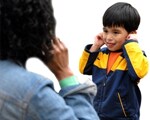Contrary to current thinking, environmental factors may play a larger role than shared genes in the development of autism.

Environmental influences mean anything that isn't in the genetic code. Research has suggested that a host of possible factors, including advanced maternal or paternal age, assisted reproductive technology and artificial insemination, maternal infections during pregnancy, giving birth to multiples, prematurity and low birth weight and complications during birth, could be among the environmental factors. One widely-publicised, and now discredited claim, was that the MMR vaccine was a trigger, but the research was found to be fraudulent. Another possible environmental factor is the use of certain medications during pregnancy, including antidepressants.
Researchers from America identified 192 pairs of twins from a statewide California registry of children who receive services for developmental disabilities. At least one twin was diagnosed with an autism spectrum disorder, which researchers confirmed by examining and testing each child. The study included 54 pairs of identical twins (meaning they share all of the same genes) and 138 pairs of fraternal twins (who share half of their genes). About 42.5 percent of the male-male pairs and 43 percent of the female-female pairs of identical twins both had autism. About 12.9 percent of the male-male fraternal twins and 20 percent of the female-female fraternal twins both had autism. It's not surprising that the identical twins were more likely to each have autism, since they share all the same genes.
Research has suggested that genetics play a role in the development of autism. Nevertheless, if a disorder was 100 percent due to genetics, both siblings in each pair of identical twins would have it, which is not the case with autism. That means the shared environment - and this could be in utero or in early life - has to play a major role, the researchers explained. According to the researchers, this means that genes account for 37 percent of the risk of classic, or severe autism and 38 percent of the risk of milder autism spectrum disorders. By the same calculations, environmental factors would explain 55 percent of the risk of autism and 58 percent of the risk for an autism spectrum disorder.
The research is interesting and a good reminder that it's important for researchers to search for environmental triggers of autism. However, a close look at the statistics shows they might not be as powerful as it seems. The statistics have a wide confidence interval, or range of uncertainty. For the genetic influence on autism, for example, the confidence interval was 9 percent to 81 percent - meaning there's a chance that the actual number could fall anywhere in that range.
In another study, researchers found a two-fold risk of autism spectrum disorder among children whose mothers took antidepressants known as selective serotonin reuptake inhibitors (SSRI) during pregnancy, and that the risk was more than three times higher if the mothers took the drugs during early pregnancy, compared to children without the disorder. SSRIs include widely used antidepressants. About 6.7 percent of women who had a child with autism reported taking anti-depressants during pregnancy, compared to 3.3 percent of controls, or women who did not have a child with autism. However, the researchers cautioned that the number of children in the study who were exposed prenatally to SSRIs was low. They say that further studies are needed to validate the results.
Though the risks and benefits taking any medication during pregnancy should be carefully considered, it is advised that expectant mothers who suffer from depression should not take self-medicate. That's because depression itself poses a risk to mother and baby. Depressed women may self-medicate with drugs and alcohol, fail to eat right and keep their prenatal appointments, and be unable to care for their baby after delivery.
DoctorNDTV is the one stop site for all your health needs providing the most credible health information, health news and tips with expert advice on healthy living, diet plans, informative videos etc. You can get the most relevant and accurate info you need about health problems like diabetes, cancer, pregnancy, HIV and AIDS, weight loss and many other lifestyle diseases. We have a panel of over 350 experts who help us develop content by giving their valuable inputs and bringing to us the latest in the world of healthcare.












